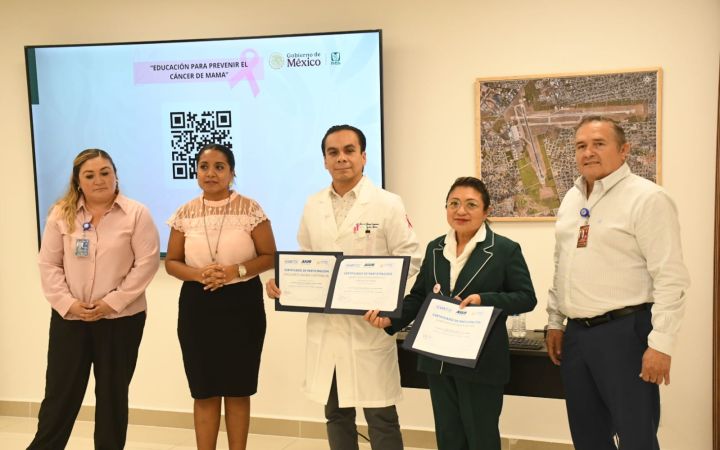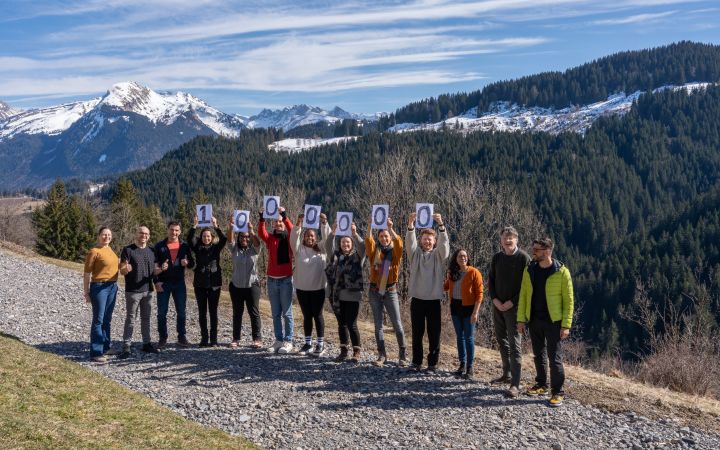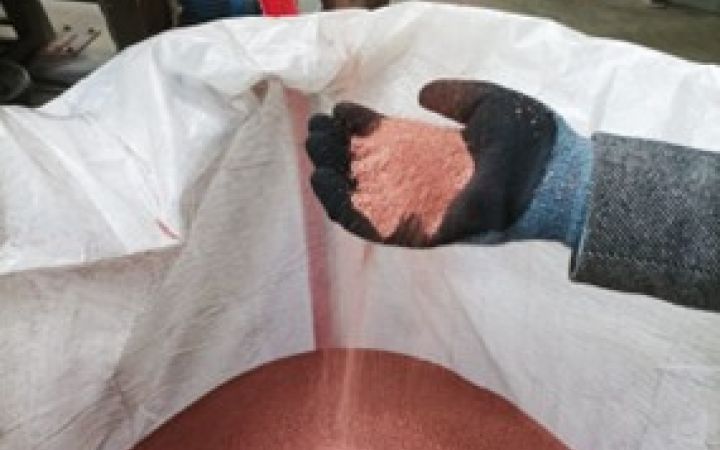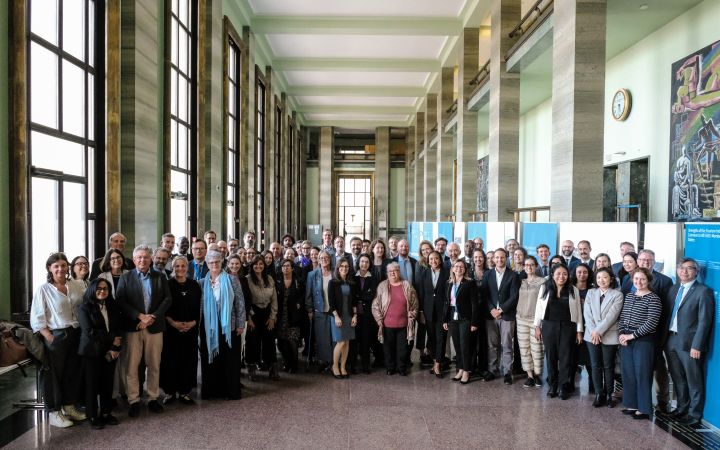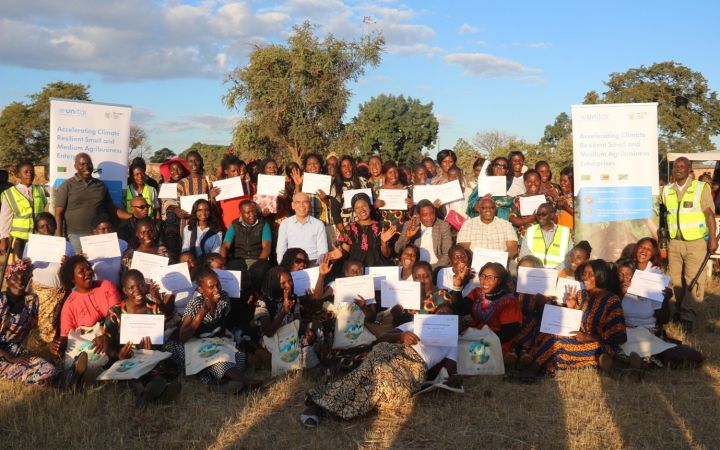Displaying 71 - 80 of 1525
17 October 2025, Merida, Mexico – As part of Breast Cancer Awareness Month, the International Training Centre for Authorities and Leaders in Merida (CIFAL Merida), an affiliated training centre of UNITAR, in coordination with the Mexican Social Security Institute (IMSS), hosted a workshop entitled “Education for the Early Detection of Breast Cancer”. The initiative aimed to encourage self-examination and promote timely health care among airport employees and service providers.
16 October 2025, Geneva, Switzerland - In light of the 30th United Nations Climate Change Conference (COP30) in Belém, the United Nations Secretary-General has issued a message highlighting the vital role of climate education in tackling the climate crisis.
15 October 2025, Beirut, Lebanon - The International Training Centre for Authorities and Leaders in Lebanon (CIFAL Lebanon), an affiliated training centre of UNITAR, is pleased to present a workshop titled “Strengthening Project Impact through Monitoring, Evaluation, Accountability, and Learning (MEAL)” on 26-28 November 2025.
New York, USA, 7-8 October 2025 - UNITAR joined forces with the Vision Zero Fleet Safety Forum 2025, hosted with the support of the NYC Department of Citywide Administrative Services and in collaboration with Together for Safer Roads. The Forum brought together leading stakeholders from public and private fleets, innovative safety technology companies, policy experts, and road safety advocates, as well as federal, state, and city agencies, non-profits, and universities, for the common goal of advancing road safety.
In 2024, CIFAL Płock achieved a major milestone with the launch of the Autosobriety Poland platform, a digital hub dedicated at promoting responsible driving behaviours and preventing alcohol-related road incidents. This platform provides a range of interactive resources, including educational materials, online training modules, and awareness campaigns designed to engage diverse audiences, from young drivers to professionals. By leveraging technology, the platform makes the programme more accessible and scalable, allowing more people across Poland to participate in road safety training. The platform also facilitates partnerships with schools, businesses, and community organizations, ensuring that road safety education is integrated into daily practices.
14 October 2025, Geneva, Switzerland - Ms Michelle Gyles-McDonnough, Executive Director of UNITAR and UN Assistant Secretary-General, has built a distinguished career in sustainable development and international cooperation, guided by a deep commitment to people, equality, justice, and peace. In the fourth episode of the Learning with Leaders podcast, listeners are invited to meet UNITAR’s Executive Director and hear her reflections on the journey that has shaped her leadership.
Marking International E‑waste Day 2025, UNITAR and its partners highlight new findings showing that Europe’s discarded electronics contain around one million tonnes of critical raw materials (CRMs) such as copper, aluminium, palladium, and rare earth elements each year.
In 2022, Europe generated 10.7 million tonnes of e‑waste, with only 54 per cent managed through compliant systems. By 2050, the amount of valuable materials could rise to 1.9 million tonnes, and with improved design, collection, and recycling, up to 1.5 million tonnes could be recovered annually.
Experts including Dr Kees Baldé (UNITAR -SCYCLE), Jessika Roswall (European Commission), and Pascal Leroy (WEEE Forum) emphasise that e‑waste is not simply waste but a strategic resource that can strengthen Europe’s economy, reduce dependency, and create green jobs if managed within a circular economy.
In 2022, Europe generated 10.7 million tonnes of e‑waste, with only 54 per cent managed through compliant systems. By 2050, the amount of valuable materials could rise to 1.9 million tonnes, and with improved design, collection, and recycling, up to 1.5 million tonnes could be recovered annually.
Experts including Dr Kees Baldé (UNITAR -SCYCLE), Jessika Roswall (European Commission), and Pascal Leroy (WEEE Forum) emphasise that e‑waste is not simply waste but a strategic resource that can strengthen Europe’s economy, reduce dependency, and create green jobs if managed within a circular economy.
09 October 2025, Monaco City, Monaco - An important agreement was signed at the Monaco Yacht Show between NAVIGO, the centre for innovation and development in the nautical sector; GIOYA Higher Education Institution, a learning business club for leaders; and the United Nations Institute for Training and Research (UNITAR).
8 October 2025, Geneva, Switzerland - On 30 September and 1 October 2025, the United Nations Institute for Training and Research (UNITAR), through its Global Water Academy, successfully hosted the 42nd UN-Water Meeting at the Palais des Nations in Geneva.
7 October 2025, Geneva, Switzerland – The United Nations Institute for Training and Research (UNITAR), with the Arab Bank for Economic Development in Africa (BADEA), invites women and youth agripreneurs from Tanzania, Zambia and Zimbabwe to apply for Phase III of the UNITAR-BADEA Accelerating Sustainable and Climate Resilient Livelihoods Through Development of Small and Medium Agribusiness Enterprises for Women and Youth programme. The programme is open to applicants who participated in Phases I and II. This latest phase focuses on helping entrepreneurs move from planning to practical action – turning their business concepts into climate-smart, market-ready enterprises. Application deadline is 15 October 2025.


